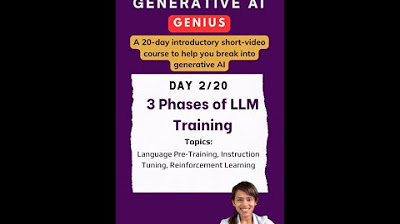The Biggest Problem With ChatGPT | Tsoding
Summary
TLDRThe speaker expresses frustration with LMS (Large Language Models) for their propensity to generate inaccurate or fabricated information, which they find anxiety-inducing and impractical for serious tasks. They compare the current reliance on LMS to the simpler, more efficient use of Google for straightforward queries a decade ago, suggesting a degradation in tool quality. The speaker criticizes the overreliance on complex tools for trivial tasks and questions the value of such technology when it introduces more uncertainty and verification work.
Takeaways
- 🤖 The speaker expresses dissatisfaction with LMS (Learning Management Systems) due to their propensity to generate incorrect or fabricated information.
- 🚫 The speaker finds LMS unusable for anything beyond trivial tasks because of the time-consuming verification process required to ensure accuracy.
- 😓 There is a sense of anxiety conveyed about the reliability of information provided by LMS, as the speaker questions the veracity of the content.
- 💻 The speaker criticizes the reliance on LMS for tasks that were once efficiently handled by simpler tools like Google searches.
- 📉 The speaker laments a perceived degradation in the quality of tools over the past decade, suggesting that what was easily managed with basic search engines now requires complex systems.
- 😡 There is a strong opinion against the idea of accepting LMS-generated inaccuracies as a norm, indicating a value for precision and integrity in work.
- 🤔 The speaker questions the convenience of LMS, arguing that they create more work and uncertainty rather than simplifying tasks.
- 🧐 The speaker reflects on the necessity of critical thinking and verification in the digital age, where information can be easily manipulated.
- 🔍 The speaker highlights the importance of skill in discerning reliable information sources, suggesting that the value of tools like Google has diminished over time.
- 💬 There is a call for a return to more reliable and efficient methods of information retrieval, indicating a preference for quality over convenience.
Q & A
What is the main concern expressed about using LMS for tutorials?
-The main concern is the potential for LMS to 'hallucinate' or generate incorrect or non-existent information, which can lead to anxiety and the need to spend more time verifying the content than learning from it.
Why is the speaker suggesting that LMS is nonusable for certain tasks?
-The speaker finds LMS nonusable because the risk of receiving incorrect information outweighs the benefits, especially for tasks that require accuracy and verification.
What does the speaker imply about the convenience of using LMS?
-The speaker questions the convenience of LMS due to the need to constantly verify the information it provides, which can be more cumbersome than finding the information through traditional means.
What is the speaker's opinion on the quality of tools and their evolution over time?
-The speaker believes that the quality of tools, specifically referencing Google, has degraded over time to the point where complex systems like LMS are now necessary for tasks that were once simple.
What does the speaker suggest about the relationship between the quality of work and the use of LMS?
-The speaker implies that a lack of concern for the quality of work could lead to an acceptance of LMS adding incorrect information, suggesting a correlation between work ethic and reliance on LMS.
How does the speaker view the current state of LMS in comparison to Google's capabilities 10 years ago?
-The speaker views the current state of LMS as a regression in quality, comparing it unfavorably to the capabilities of Google a decade ago and suggesting that the need for LMS indicates a decline in the effectiveness of simpler tools.
What does the speaker mean when they mention 'trivial things' in the context of LMS?
-The speaker refers to 'trivial things' as basic information that should be easily accessible and verifiable without the need for complex systems like LMS, implying that LMS's use for such tasks is overkill.
What is the speaker's stance on the necessity of LMS for trivial tasks?
-The speaker is critical of the use of LMS for trivial tasks, arguing that it is an inefficient use of resources and indicative of a decline in the quality of simpler tools like search engines.
How does the speaker feel about the current reliance on complex systems for tasks that were once simple?
-The speaker expresses frustration and disbelief at the current reliance on complex systems like LMS for tasks that were once simple and could be handled by basic search engines.
What does the speaker suggest is the 'real problem' with the use of LMS?
-The 'real problem' the speaker identifies is the complacency and lack of concern for the quality of work, which leads to an acceptance of LMS's potential inaccuracies.
Outlines

Cette section est réservée aux utilisateurs payants. Améliorez votre compte pour accéder à cette section.
Améliorer maintenantMindmap

Cette section est réservée aux utilisateurs payants. Améliorez votre compte pour accéder à cette section.
Améliorer maintenantKeywords

Cette section est réservée aux utilisateurs payants. Améliorez votre compte pour accéder à cette section.
Améliorer maintenantHighlights

Cette section est réservée aux utilisateurs payants. Améliorez votre compte pour accéder à cette section.
Améliorer maintenantTranscripts

Cette section est réservée aux utilisateurs payants. Améliorez votre compte pour accéder à cette section.
Améliorer maintenantVoir Plus de Vidéos Connexes

W2 5 Retrieval Augmented Generation RAG

A basic introduction to LLM | Ideas behind ChatGPT

Few-Shot Prompting Explained

Introduction to Generative AI (Day 2/20) How are LLMs Trained?

Will ChatGPT replace programmers? | Chris Lattner and Lex Fridman

Generative AI Vs NLP Vs LLM - Explained in less than 2 min !!!
5.0 / 5 (0 votes)
